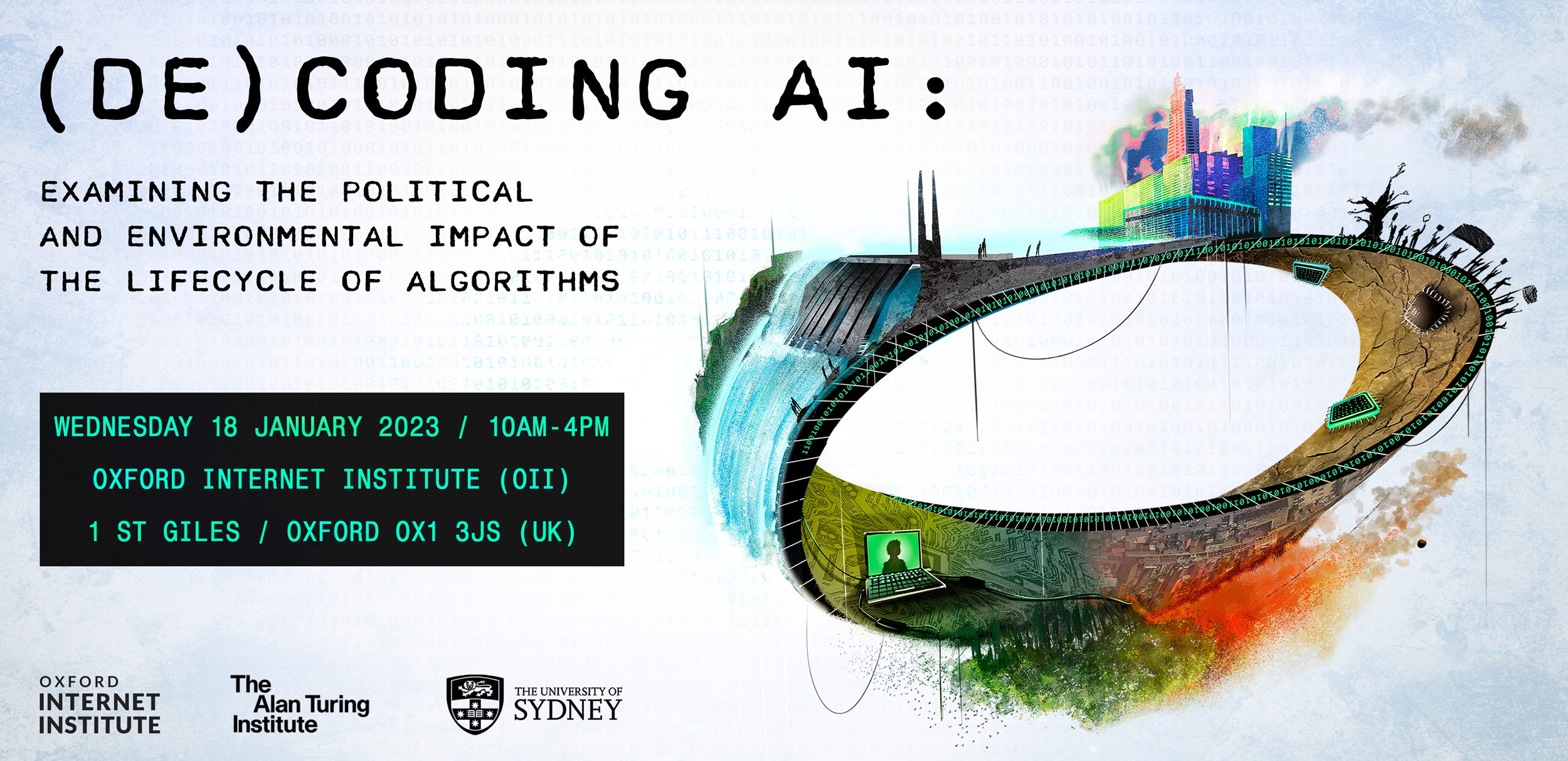
Research Programme on AI, Government and Policy
This programme supports research on AI, Government and Policy.
Ana Valdivia is a Departmental Research Lecturer in Artificial Intelligence (AI), Government, and Policy at the Oxford Internet Institute (OII). Her interdisciplinary work, situated at the intersection of Critical Data/AI Studies and Computer Science, has made significant contributions to digital sustainability, tech surveillance and society, and algorithmic fairness. With a background in mathematics, her research focuses on bridging the gap between AI studies and the social sciences. She investigates how datafication and algorithmic systems are transforming political, social, and ecological territories. She collaborates with civil and digital society organisations and has been invited to present her research at relevant institutions such as the European Parliament and Barcelona City Hall during DecidimFest and the Biennal del Pensament. Ana is currently a Visiting Research Fellow at the UCL Centre of Advanced Studies.
Her current work examines the trade-off between environmental costs and social benefits of AI by investigating its supply chains, from mineral extraction to chip manufacturing, data centres, and electronic waste dumps. She is currently writing a book on this topic for Bristol University Press. Ana has explored the impact of datafication technologies in various contexts, including migration, gender-based violence and criminal justice. Her interdisciplinary research agenda combines quantitative (computational methods) and qualitative methodologies (ethnographic methods) while collaborating with scholars from diverse disciplines, including political science, philosophy, and law. Her work has been published in notable AI and ethics conferences, such as ACM Fairness, Accountability, and Transparency (FAccT), the AAAI/ACM Conference on AI, Ethics & Society, AI & Ethics, and AI & Society.
Ana is currently an Associate Editor for the journal Big Data & Society, that publishes interdisciplinary work principally in the social sciences, humanities and computing and their intersections with the arts and natural sciences about the implications of digital technologies.
In 2023, her research on AI supply chains was made possible by a grant from the British Academy. In 2022, Ana received the Post-Doctoral Enrichment Award by The Alan Turing Institute. She is also a former fellow of Data Science for Social Good programme at the University of Chicago. Her work has had a notable impact beyond academia and has garnered attention from international media outlets such as The Guardian, El País, The Washington Post, The New York Times, and Thomson Reuters, among others. She has delivered keynote talks at the University of Cambridge, Tecnológico de Monterrey, and the University of Southampton, and has been invited by the historic debating and free speech society, the Cambridge Union.
Ana is interested in supervising projects that bring an original perspective on AI across a variety of fields, such as Science and Technology Studies (STS), Critical Data/AI Studies, Natural Language Processing (NLP), and Computational Social Science (CSS). As the main convenor of the course on Fairness, Transparency and Accountability in Machine Learning, she invites proposals that creatively explore gaps and explore possibilities within the broad sociotechnical aspect and technopolitics of AI. Proposals are welcome from diverse backgrounds and contexts, including political ecology, media ecologies, surveillance studies, and digital infrastructures. Below is a list of potential topics, though it is not exhaustive:
She strongly encourages students from any background who are eager to push the boundaries between disciplines and explore interdisciplinary methods within Critical Data/AI Studies to apply to work with her.

With Dr Ana Valdivia
This talk presents insights from an 18-month investigation into the supply chains of AI, funded by a British Academy grant awarded to Dr Ana Valdivia.

With Dr Keegan McBride, Dr Ana Valdivia, Mustafa Mahmoud, Lori Roussey, and Yasah Musa
The panelists will evaluate regulatory frameworks, examine the role of digital ID in improving inclusivity & the impact on service delivery

With Dr Ana Valdivia
This workshop will explore the interactions and controversies of algorithms beyond the code.

20 June 2025
OII researchers are set to attend the Association of Computing Machinery (ACM) Conference on Fairness, Accountability and Transparency (FAccT) 2025.

17 June 2025
Dr Adam Mahdi, Dr Ana Valdivia, Professor Greg Taylor, and Professor Kathryn Eccles are among the teaching faculty recognised for teaching excellence at Oxford.

9 June 2025
The Oxford Internet Institute’s Franziska Sofia Hafner explores whether language models are perpetuating gender stereotypes.

21 May 2025
Oxford researchers reveal how AI language models encode a flawed and binary understanding of gender, posing significant risks for transgender, nonbinary, and even cisgender individuals.

El País, 28 October 2024
A study calculates that, if waste reduction measures are not taken, the equipment that will become obsolete in data centers until 2030 will cause a significant environmental problem.

The Guardian, 25 September 2024
Many fear the arrival of tech giants such as Amazon, Microsoft and Google in the state of Querétaro will place too much of a strain on scarce water and electricity resources.

Thomson Reuters Foundation News, 06 September 2024
Artificial intelligence lives on power and water, fed to it in vast quantities by data centres around the world. And those centres are increasingly located in the global south.

DPhil Student
Lujain is a DPhil student in Social Data Science at the OII. Her research sits at the intersection of AI governance and human-centred computing, particularly examining how user autonomy and control are undermined in human-AI interactions.

DPhil Student
Anna George is a Social Data Science doctoral student who uses computational approaches to study online political behaviour. Her research focuses on the message diffusion of alternative communities such as hate groups and political extremists.

DPhil Student
Boxi (bor-shi) is a DPhil researcher at the Oxford Internet Institute and a Research Policy Consultant with the OECD’s AI Policy Observatory (OECD.AI).
Integrating historical and cultural context with contemporary scholarship, this course equips students with the technical and conceptual tools to engage critically with machine learning research and practice.